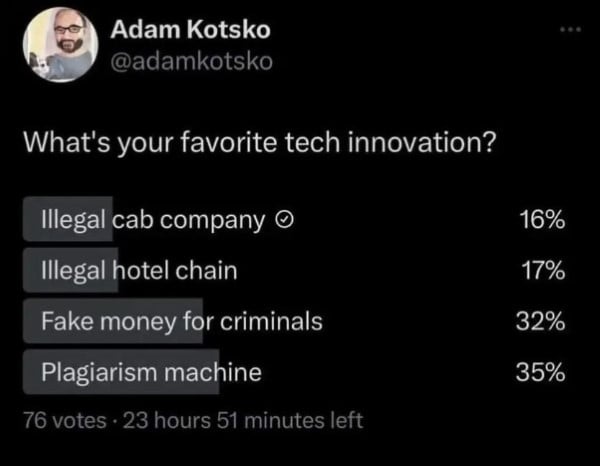nothing here but free dogs
issue 220 - 28th May, 2023
CJW: Welcome back. Good to have you with us. I hope you're keeping your head above water, and reaching out to help others around you do the same. It's tough out there, and feels like it's only getting tougher. So look out for yourself and your loved one.
This main newsletter will always be free, but if you want to support us, you’ve got a couple of options:
Both give you access to the full bonus archive, as well as new bonuses as they are posted. And if you want to forward this email to help spread the word, we would greatly appreciate it.
The Team
Daniel Harvey (DCH) - Designer, writer, provocateur. Pro-guillotine tech critic. @dancharvey
Marlee Jane Ward (MJW) - is also Mia Walsch. Writer, apocalypse witch, goth aunt.
Corey J. White (CJW) - Author, sin-eater, future sweetie-pie.
Lidia Zuin (LZ) - Journalist, MA in semiotics, and PhD in Arts. Sci-fi writer, futurology researcher and essayist. @lidiazuin
Climate Change & The Environment
MJW: The Law of the Sea by Surabhi Ranganatha at The Dial
In 2007, Russia planted its flag on the Arctic seafloor, staking exclusive claim to vast oil and gas deposits, on the basis that melting ice had revealed a longer continental shelf. Many reacted in tones of outrage or alarm. The Canadian foreign minister stated, on television: “This isn’t the 15th century. You can’t go around the world and just plant flags and say: ‘We’re claiming this territory’.” Of course, it was not 15th century practice, but rather 20th century international law that grounded Russia’s claim; it has since also brought this claim within the designated UNCLOS procedure. And it is the 20th century escalation in global warming caused by the extraction of fossil fuels that is melting the Arctic ice and bringing its hydrocarbons into view. We now rightly look to law for solutions to climate change, but we might also keep in mind that the problems we are asking it to address have been enabled by its own regimes.
On rethinking oceanic laws with climate change in mind.
//
CJW: Saving forests won't stop climate change — we need big emissions cuts - Jéssica Maes at The Verge (via Sentiers)
The researchers also highlight that the forest carbon sink (its ability to absorb carbon) should be preserved to offset residual emissions from sectors where they are unavoidable, rather than to compensate for present emission levels.
We need to address output (and thus consumption) as well as trying these carbon capture options. It's not either/or. Especially when the carbon credit market is mostly greenwashing bullshit: CEO of biggest carbon credit certifier to resign after claims offsets worthless - Patrick Greenfield at The Guardian
//
The Linked Ecological Futures Of America And China - "When one country’s desert forms another’s rain, then one’s dream is another’s peril." - Roman Shemakov at Noema
None of the world's top industries would be profitable if they paid for the natural capital they use - David Roberts at Grist (via Sentiers) - "Of the top 20 region-sectors ranked by environmental impacts, none would be profitable if environmental costs were fully integrated. Ponder that for a moment: None of the world’s top industrial sectors would be profitable if they were paying their full freight. Zero."
“Orcas have sunk 3 boats in Europe and appear to be teaching others to do the same. But why? Scientists think a traumatized orca initiated the assault on boats after a "critical moment of agony" and that the behavior is spreading among the population through social learning.”
//
Just the headlines:
Planet will likely clear 1.5°C barrier for the first time before 2027 - Matthew Ward at Cosmos
A Massachusetts Town Is Suing Monsanto for Its Cancer-Causing PCBs
Fossil fuel firms owe climate reparations of $209bn a year, says study
Geopolitics & Empire
DCH: UK Army Officers Forced Electric Shock Treatment on Gay Soldiers by By Ellen Milligan at Bloomberg
Another veteran, who served in the Royal Air Force, testified that they were sent to a psychiatric ward to be interrogated about their sexuality while seated on a commode. Electrodes were attached to their head and used to take a reading of their brain while medical staff drank lager. They were told they had a “shadow” on their brain, which explained their sexuality.
Testimony from a study of personnel who served from 1967-2000. CW for torture and assault. I’m sure the Tories will say there’s no such thing as institutional homophobia in the armed forces…
//
Following failed kidnapping of Imran Khan, Pakistan's regime desperately cracks down on dissent - Junaid S. Ahmad at Geopolitical Economy Report - CJW: A clear and complete summary of the situation in Pakistan around Imran Khan. Really put the whole thing into perspective for me.
“About 60,000 pounds of ammonium nitrate… went missing on a rail shipment from Wyoming to California in April and has still not been found.” FWIW Timothy McVeigh’s Oklahoma City Bombing only used 5,000.
The late Anthony Bourdain wrote in 2001 that “once you’ve been to Cambodia, you’ll never stop wanting to beat Henry Kissinger to death with your bare hands.” DCH: of all the motherfuckers to make it to 100.
Just the headlines:
The Yemen War Can Be Over — If Biden Wants It - Ryan Grim at The Intercept
In Mexico, AMLO Is Shining a Light on the DEA’s Hypocrisy in the War on Drugs - Kurt Hackbarth at Jacobin
Survivors of Kissinger’s Secret War in Cambodia Reveal Unreported Mass Killings
Science & Space
CJW: Time is not an illusion. It’s an object with physical size - Sara Walker at Aeon
Assembly theory treats time as fundamental and material: time is the stuff out of which things in the Universe are made. Objects created by selection and evolution can be formed only through the passing of time. But don’t think about this time like the measured ticking of a clock or a sequence of calendar years. Time is a physical attribute. Think about it in terms of Assembly, a measurable intrinsic property of a molecule’s depth or size in time.
This idea is radical because it also allows physics to explain evolutionary change. Physics has traditionally studied objects that the Universe can spontaneously assemble, such as elementary particles or planets. Assembly theory, on the other hand, explains evolved objects, such as complex molecules, biospheres, and computers. These complex objects exist only along lineages where information has been acquired specific to their construction.
If we follow those lineages back, beyond the origin of life on Earth to the origin of the Universe, it would be logical to suggest that the ‘memory’ of the Universe was lower in the past. This means that the Universe’s ability to generate high-Assembly objects is fundamentally limited by its size in time. Just as a semi-trailer truck will not fit inside a standard home garage, some objects are too large in time to come into existence in intervals that are smaller than their assembly index. For complex objects like computers to exist in our Universe, many other objects needed to form first: stars, heavy elements, life, tools, technology, and the abstraction of computing.
This piece lays out a really interesting understanding of time… but at the same time (pun not intended), the fundamental idea is obvious - that time exists (simply? entirely?) so that things can grow and change. As Burroughs said: Time is what death needs to grow people in.
Still, it's an interesting way to think about time and space, and I'm sure more science-minded types will see some interesting possibility spaces opening up.
It's a long read, but by about the halfway mark it starts to come together.
Related: AI Is Life
If life is truly a planetary phenomenon, we should expect to see the same features recurring across time at new levels of organization as they gradually scale up to the planetary. What is emerging now on Earth is planetary-scale, multisocietal life with a new brain-like functionality capable of integrating many of the technologies we have been constructing as a species over millennia. It is hard for us to see this because it is ahead of us in evolutionary time, not behind us, and therefore is a structure much larger in time than we are. Furthermore, it is hard to see because we are accustomed to viewing life on the scale of a human lifespan, not in terms of the trajectory of a planet.
What I can only assume is the same Sara Walker writing in Noema on AI (and technology more generally) representing life because it was the evolution of humanity and human intelligence that allowed us to reach it.
Tech & Design
CJW: How Hollywood used the digital transition against workers - Paris Marx
AI builds on previous developments to continue shifting power toward corporate executives and away from the people making film and television. Executives want to use AI to generate scripts, even if that means further degrading the quality of culture, and they want to use it to continue the process of divorcing the actor from their performance — so it can be changed as much as executives want in post. Visual effects is already displacing craftspeople, and AI could start to take over some of the tasks currently done by effects workers. In December, director Guillermo del Toro told Decider, “I consume and love art made by humans. I am completely moved by that. And I am not interested in illustrations made by machines and the extrapolation of information.” Legendary filmmaker Hayao Miyazaki has gone so far as to call AI animation “an insult to life itself.”
AI isn’t democratizing anything. Its latest generative iteration depends on massive centralized computing power trained on an unimaginable amount of data scraped from the open web without permission or compensation. It will serve executives and management, not workers or the wider public, and deserves to be challenged.
Something of a history of Hollywood and the various ways studios (and now tech companies) have eroded workers' rights and culture itself through the endless hunger for profit.
DCH: More here AI, the WGA Strike, and What Luddites Got Right
//
DCH: Will A.I. Become the New McKinsey? by Ted Chiang The New Yorker
The question we should be asking is: as A.I. becomes more powerful and flexible, is there any way to keep it from being another version of McKinsey? The question is worth considering across different meanings of the term “A.I.” If you think of A.I. as a broad set of technologies being marketed to companies to help them cut their costs, the question becomes: how do we keep those technologies from working as “capital’s willing executioners”? Alternatively, if you imagine A.I. as a semi-autonomous software program that solves problems that humans ask it to solve, the question is then: how do we prevent that software from assisting corporations in ways that make people’s lives worse? Suppose you’ve built a semi-autonomous A.I. that’s entirely obedient to humans—one that repeatedly checks to make sure it hasn’t misinterpreted the instructions it has received. This is the dream of many A.I. researchers. Yet such software could easily still cause as much harm as McKinsey has.
This was published while I was on holiday last issue. Ted Chiang’s critiques and warnings about AI are always worth reading though so I’m belatedly sharing icymi. Long-time readers will know I think consultants should be near the front of the guillotine queue so its nice to see this new and more accurate metaphor emerge to warn about how capital will brandish AI on us all.
//
“many researchers and engineers say concerns about killer AIs that evoke Skynet in the Terminator movies aren’t rooted in good science. Instead, it distracts from the very real problems that the tech is already causing. It is creating copyright chaos, is supercharging concerns around digital privacy and surveillance, could be used to increase the ability of hackers to break cyberdefenses and is allowing governments to deploy deadly weapons that can kill without human control.”
DCH: A lot has been written about Elno Skum and his rapid unassembly of Twitter and how he’s lurched the toxic hellsite even further to the right but these three recent articles are rather good and likely the last I’ll share on the topic as I’d rather find new things to doomscroll about.
The poisoning of ChatGPT - Baldur Bjarnason & Ban LLMs Using First-Person Pronouns - "We are greedier and lonelier than we are dignified." - Kevin Munger (both via Rob Horning)
Just the headlines:
Chinese internet trolls are adopting American racism to taunt Black users
Meta hit with record-breaking $1.3 billion fine over Facebook data transfers to the US
Online extremism linked to rise in school shootings in Brazil, researchers find
Society & The Culture
CJW: Book Publishers Are Trying to Destroy Public E-Book Access in Order to Increase Profits - Stephen Prager at Current Affairs
[Libraries] can remain stuck in the past by only offering physical books and risk losing the many patrons who understandably prefer the convenience of an e-book. Or they can purchase licenses from corporations that want to wring them out like sponges, which leaves them with far less to spend on everything else.
Either way, they lose. Libraries nationwide have reduced their collections over the years, in part due to the high cost of e-books, as their budgets have not kept pace with the rising prices. According to Michael Blackwell, a library director in Southern Maryland, this forces them to prioritize bestsellers and ignore new authors, while allowing the licenses of older, more obscure books to expire or never be purchased in the first place.
Fuck all the publishers who went after the Internet Archive.
While the publishing industry treats this as an issue of authors’ rights, many other authors have criticized the ruling. One group of more than 1,000 authors, including Naomi Klein, Chuck Wendig, and Neil Gaiman, signed onto a statement calling for publishers to “end lawsuits aimed at intimidating libraries and diminishing their role in society,” including the Internet Archive. It’s clear that publishers don’t actually care what authors think of their lawsuit, so we can discount their claim to be acting on behalf of writers’ interests.
It's just fucking corporate greed. It always is.
//
MJW: The free dogs of India by Krithika Srinivasan & Chris Pearson at Aeon
Too often in the West, dogs are seen through the prism of pedigree, and connected to their owner via collars and leashes. All too often, the realities of how dogs and humans live together in the Global South are overlooked. As a country with a significant street-dog population, India is a good place from which to explore how humans and canines share street life in cooperative ways that move beyond images of free-living dogs as dangerous. Exposing the reality is crucial given rising media calls for culling Indian street dogs, exposing them to rhetorical and actual violence. The condemnation of street dogs as risky and unwelcome is rooted in colonial attitudes, and overlooks complex and varied everyday interactions, often positive, between dogs and humans. Discussing their lived experience will help the dogs themselves, and also help us reflect on how humankind can share the planet with all the other creatures who live on it.
On the colonial notion of pet ownership, and the alternatives through the lens of India’s free-living dogs.
//
The Secret History And Strange Future Of Charisma - Joe Zadeh at Noema - "How our culture, politics and technology became infused with a mysterious social phenomenon that everyone can feel but nobody can explain." - CJW: This piece covers a lot of interesting ground, including efforts to quantify charisma and recreate it in AI systems.
America’s current homophobic book banning resurgence is all thanks mainly to just 11 people.
Mat Bors has announced The Nib is shutting down.
Health, Cooking, and Related
“The state can now kidnap kids in Florida. Florida Governor Ron DeSantis signed a horrifying bill Wednesday that will let the state take transgender minors away from their families if they are receiving gender-affirming care.”
A tech billionaire has harvested his son for blood in his quest to attain eternal youth.
Just the headlines:
Labour & Economics
DCH: When digital nomads come to town by Stephen Witt at Rest of World
Within these cities, nomads cluster in safe and prosperous neighborhoods. Laureles, in Medellín, is a tranquil barrio with a university, clean streets, and middle-class inhabitants. But the income differential between the nomads and the Colombian professional class is immense. The result is runaway price inflation — rents in Laureles have skyrocketed, and restaurants cannot raise their prices fast enough. A one-bedroom in Medellín now rents for the “gringo price” of about $1,300 a month, in a country where the median monthly income is $300.
An excellent read on how remote working knowledge workers are the tip of the spear of a new style of gentrification. Consider it AirBNB 2.0.
//
MJW: Life inside the South African gangs risking everything for copper by Monica Mark at Financial Times
The copper thieves were known as izinyoka, “snakes” in Zulu, and they barely made a sound as they prepared early one morning. On the porch of a rundown breezeblock home in Johannesburg’s largest township, the three men pulled on their disguise of municipal workers’ coveralls, then shared a smoke. The air filled with clouds of nyaope, a cocktail of black-tar heroin cut with marijuana, rat poison and antiretroviral drugs... Copper was the new gold, as far as their gang was concerned, and anywhere it could be found was fair plunder...In January, the consequences of industrial-scale theft in South Africa included: three security guards killed during heists; three hospitals scaling back operations because stolen copper plumbing hampers their ability to pipe oxygen to intensive care units; trains cancelled due to stolen signalling cable or track sleepers; parts of the city going without electricity for days after thieves toppled pylons.
It’s impossible to consider all the costs of copper theft when you live in poverty, but it has far-reaching effects.
//
Origin Stories: Plantations, Computers, and Industrial Control - Meredith Whittaker at logicmag - "The proto-Taylorist methods of worker control Charles Babbage encoded into his calculating engines have origins in plantation management."
What it looks like when jobs disappear in the shadow of AI: “In the end, we’re still getting more AI and fewer humans — even if the AI is not doing the humans’ job, exactly. AI will be used by executives and managers much this way, I think: to help gin up investment in future-forward products that require less labor costs to make, to buffer layoffs or attrition in human departments, and to hire more part-time or project-based workers.”
Amazon is operating injury mills — more than thirty-six thousand of its workers suffered serious injury last year.
The United States of Bed Bath & Beyond (DCH: Come for the Soprano references, stay for the brilliant and thoroughly researched breakdown of how capitalism eats its own.
Podcasts
MJW: Endless Thread #BlackFaeDay from WBUR
Once upon a time, in a magical land of Oklahoma, fairy Jasmine LaFleur wanted to create a hashtag to unite Black fairies all across the land. She only had 300-something followers on social media, it's true. But she's become somewhat of an influencer. "It was really a miracle," she told Endless Thread. A miracle because since 2021, on the second Saturday of May, Black fairy enthusiasts have united around #BlackFaeDay to show the world that Black fairies are real, and that there's space for them online and off.
On subcultures, belonging, Black joy and Black fairies. I was in a bad mood when I listened to this and it just brightened my day.
Video
CJW: CLANKER MAN - award winning comedy short film by Ben Steiner
This is a 10-minute short film, which you should go and watch before reading on.
Go on, do it.
Alright. I thought this was brilliant. The premise and the mockumentary format would have been enough to carry it on its own, but with the final scene you see something much different and darker coming to the fore. The world of the short is a lonely one, with signs of being lived in such as cars driving by or in parking lots*, but no actual people beyond the Clanker Man, the film crew, and one local fed up by all the clanking.
One reading could be that this is literally an emptied world, post- some sort of cataclysm, with workers like the Clanker employed to keep the few remaining people from being overwhelmed by loneliness. Another reading could be that it’s about the increased social atomisation post-covid (I’m not blaming lockdowns because these broader trends started well before the pandemic), how disconnected we feel from society in general - though in this fantasy there is a collective government effort to address the issue… If we go with this latter reading, then I should thank the hoons fanging it around the streets near my house on random nights - they’re just trying to remind me that I’m not alone.
*Though who’s to say these cars aren’t staged by another worker - a Parker Man if you will?
Art
MJW: Stay Kind Company does cute homewares, prints, stickers and t-shirts with the kind of messages we like to hear.

The Self-Promotion
LZ: Show me the numbers and I’ll tell you if this is good
Inspired by a recommendation made by Corey in the last issue, about this essay on quantitative aesthetic, I wrote my own take and additions to the topic which is indeed very interesting. In a few words, Ben Davis suggests that we are currently shaping our taste based on statistics and metrics such as likes, streams, revenue. At the same time, less people are studying arts and humanities since the market demands more technical backgrounds. Therefore, we might be reaching a point where not only our taste is defined by numbers but we’re also unable to judge beyond that.
The Memes







You just read issue #220 of Nothing Here. You can also browse the full archives of this newsletter.